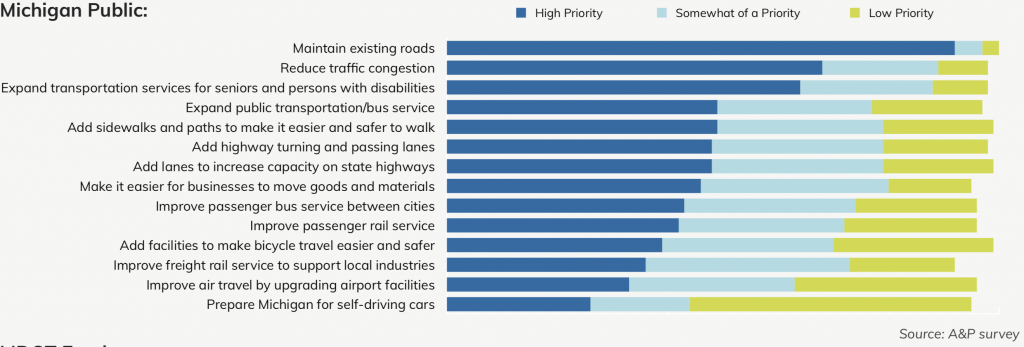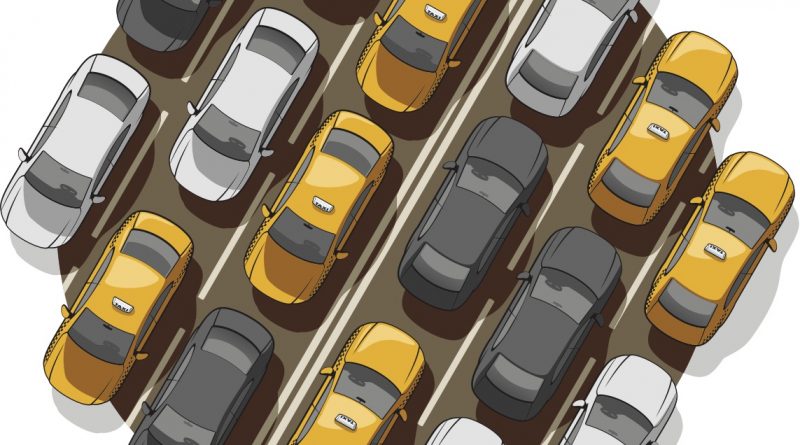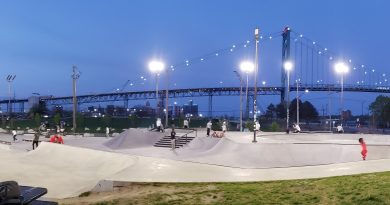New EGLE Workgroup Wants To Decarbonize Transportation… With Cars
A new statewide workgroup convened by the Michigan Department of Energy, Great Lakes, and Environment, or EGLE, kicked off yesterday with some presentations about the future of transportation in the state. EGLE, for the uninitiated, is the rebranded DNR, whose reputation suffered under the departing Snyder administration owing to, well, some stuff that was going on in Flint. Representatives from the state including MDOT, Charles Griffith of the Ecology Center, and a representative of RMI all talked about the need to decarbonize transportation. The state, they said, was committed to reducing VMT, investing in transit! We don’t, however, have much evidence for this, and this is somewhat of a problem. This is the issue that we need to address to solve both the crisis of climate change and the crisis of our state’s nearly half-century long economic stagnation.
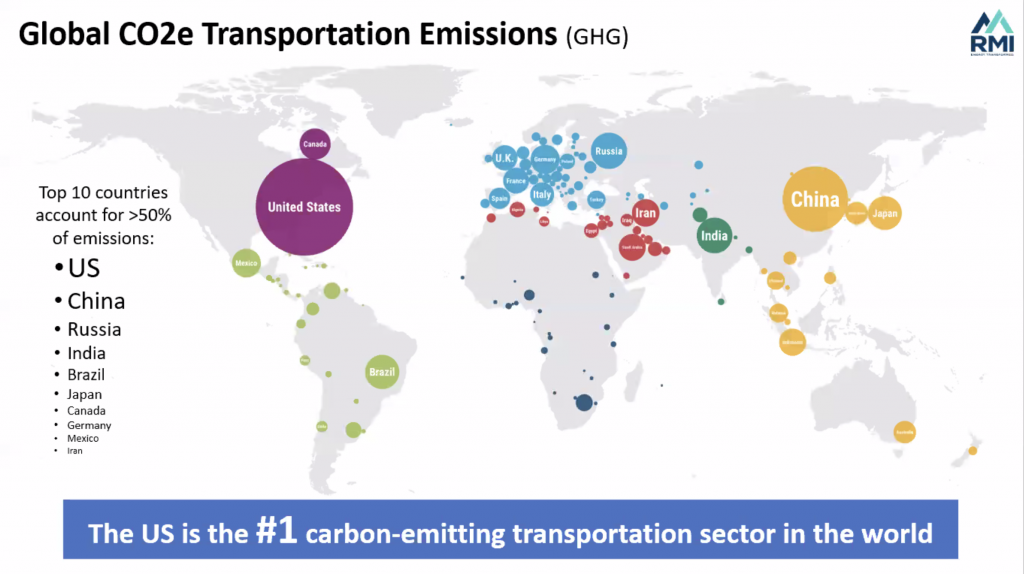
Greenhouse Gas Reductions– One Electric Car At A Time
RMI’s Britta Gross presented on challenges to addressing the issue globally (see infographic above). The climate crisis plays out in a somewhat insidious way around the issue of transportation, which, in terms of surface transportation, accounts for a double digit percentage of global carbon emissions and a far larger percentage of US carbon emissions.
We can look at it starting with the most basic and then move to the more abstract. First, electric cars represent an improvement over internal combustion engine (ICE) powered cars because they are much more efficient from a standpoint of physics and thermodynamics. An ICE SUV might get 20 miles to the gallon, whereas an electric car might get five to seven times that in “MPGe,” or “miles per gallon equivalent.” There are a lot of reasons why we should be moving toward electrifying cars. There are fewer things that can go wrong in an electric car (even if the technology is more expensive to fix because it’s more specialized and newer). The reduction in tailpipe emissions means cleaner air at a local level. I can appreciate this greatly in Southwest Detroit, where the air is filthy.
My example poking fun at American liberals is the fanciful notion that we can solve the climate crisis by driving our Subaru to Whole Foods to buy reusable metal straws.
But moving from the specific to the more abstract? Electrification doesn’t necessarily mean a greener climate. That’s because, electric or gas-powered, we’re still using a ton of energy to move individual humans around, and this is mostly a product of massively inefficient land use patterns since 1945. Sprawl, strip malls, and an emphasis on the automobile are primary drivers of our carbon footprint– not the type of engine we’re using. My example poking fun at American liberals is the fanciful notion that we can solve the climate crisis by driving our Subaru to Whole Foods to buy reusable metal straws. Subarus, beloved by the outdoorsy scene, are gas guzzlers. The Whole Foods was probably built on a greenfield site in a completely not-walkable area. Hardscaped asphalt absorbing sunlight and creating a heat island, blah blah blah. And the reusable straws? If you want to reduce energy consumption, maybe stop drinking all of that La Croix, or whatever?
Consuming Less Vs. Consuming Differently
While I don’t think there’s a firm conclusion to be made about individual versus collective responsibility, we’re being disingenuous when we say stuff like, “we can still keep consuming, we just have to consume differently!” Nah, that ain’t it. WSP, which was in attendance to defend MDOT’s virtue, for its part, doesn’t get to sit on the high horse of sustainability while it’s building highway expansions that no one wanted and that will demonstrably increase traffic. Or, while it continues to support oil and gas drilling. And don’t even get me started on Parsons Brinckerhoff. Or… the defense-engineering-industrial complex that has made a bunch of money off foreign wars. Obviously, there’s a lot of moral ambiguity in late capitalism– I’ll be the first to agree! People gotta collect a paycheck. But that doesn’t mean you need to defend things that don’t need to be defended.
The “Mobility” Council’s Report: Buy A Car, Peasants
But why the focus on electric cars? Why not talk about this Whole Foods Subaru Carbon nexus? Or, like, how we can reduce vehicle miles traveled (VMT) by promoting fixed-route transportation options?
Attendees raised questions about this, and, while I’m glad I wasn’t the only one, I was a bit dismayed that it was just us usual suspects– me, Megan Owens (of Transportation Riders United), and Todd Scott (Detroit Greenways)- pointing out some of the holes in this argument. I was a bit more direct to the point I actually feel kind of bad for coming at them. But some of this stuff, man. When we asked about why we were talking almost exclusively about electrification rather than reducing VMT, there was this sort of airy dismissal that, well, we’ll get to that. This was the same thing that Trevor Pawl came back with when I pointed out that the conclusion of the CFME’s inaugural report was basically just, like, “buy a car!”
MDOT, for its part, defended its position, saying that it was focusing on these things. MDOT and other attendees, when pressed, briefly talked up the values and virtues of transit infrastructure in addressing the climate crisis. A 2019 survey the road engineering agency conducted as part of its 2045 long-range plan, though, tells a completely different tale. And, perennial cantankerous workgroup attendee that I am, I had to point out some of these inconsistencies. It’s one thing to say, “yeah, VMT reduction is important!” or, “yeah, transit is important!”and it’s another entirely to say, “yes, we’re going to actively examine these issues in detail and focus on them primarily as part of our workgroup!”
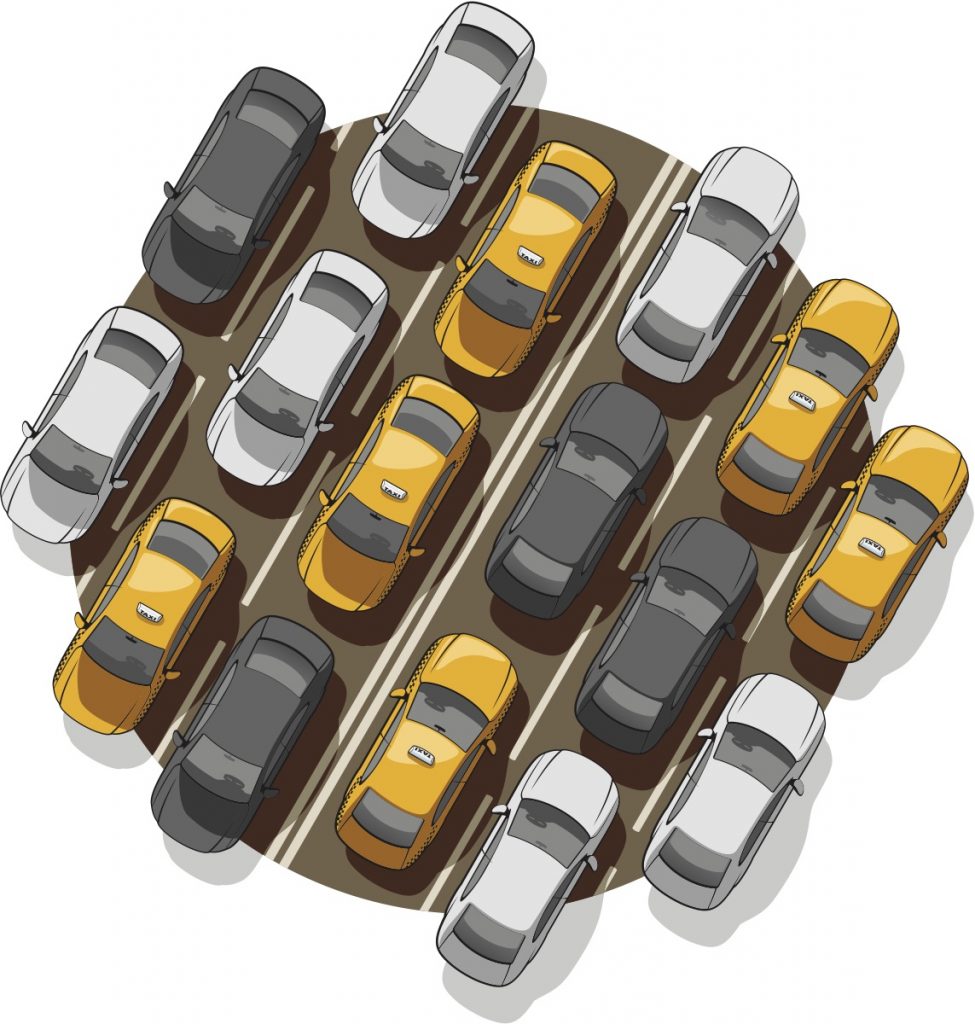
Survey: Priority of Michigan Transportation Issues
The following infographics illustrate responses to a MetroQuest online survey conducted from January to April 2019. The two tables break down the priorities of the Michigan public versus those of MDOT employees. And the differences between external and internal responses could not be any more stark. MDOT’s own employees prioritized maintaining existing roads (nearly 100%), reducing traffic congestion (around 60%), and adding lanes (a shocking 50%). Improving passenger rail ranked as a high priority for only about 35% of respondents.
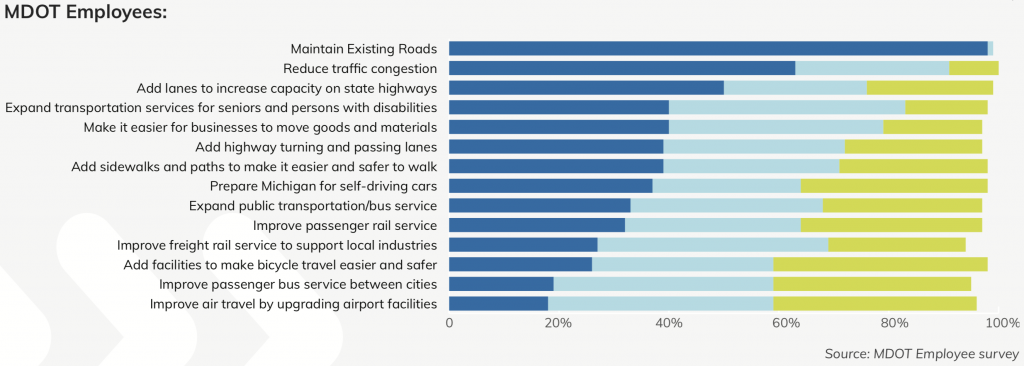
In contrast, the public disproportionately favored passenger rail service and transit service. Shocking? No. MDOT comprises road engineers. It lacks, for the most part, transit advocates. To the state’s credit, there are some things going on in passenger transportation. Passenger rail expansion these days, for example, is a particularly hot topic. But most of this is coming from a federal push from Amtrak Joe. This might be somewhat debatable, because Michigan does have a few particularly strong local, regional, and statewide advocates for transit innovation. But by the dollars and cents, Michigan’s way behind.
Detroit, for its part, is one of the most behind. And we can’t decarbonize anything until we start talking about the roots of these issues. We’re not going to solve the climate crisis through electric SUVs. We’re going to solve it by simply incrementally altering our paradigms of consumption. The solution, rather, has to begin and end with land use in many ways, but, for the purposes of the EGLE group, whose aim is ostensibly to try and decarbonize transportation, we’re going to have to focus on reducing the number of vehicle miles traveled, and that means talking seriously about fixed-route transit infrastructure. We can’t be worried about offending the automotive gods. If they’re nimble, they’ll still figure out ways to innovate and make money (I wrote 236 pages about this for my graduate thesis).
I’m going to keep coming to these meetings because I think the VMT voice is utterly lacking in these discussions, but suffice it to say, yesterday’s was a somewhat disappointing kickoff.
